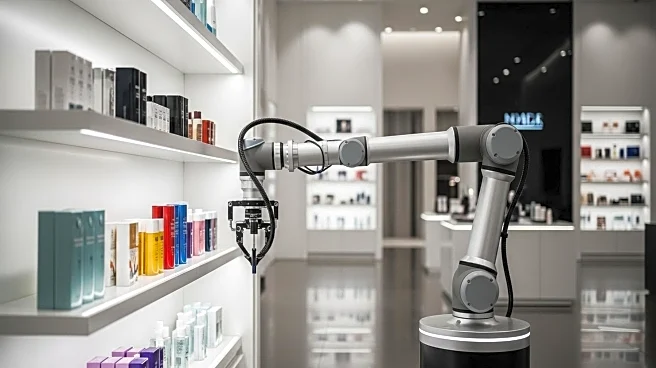What is the story about?
What's Happening?
Artificial intelligence is revolutionizing the retail industry by transforming store operations and enhancing customer experiences. Retailers are increasingly adopting AI-driven technologies such as computer vision and real-time decision-making tools to improve situational awareness on the sales floor. These technologies help identify empty shelves, prioritize restocking based on revenue impact, and assign tasks to store associates efficiently. The shift from traditional business-to-consumer (B2C) models to business-to-agent (B2A) commerce is underway, where AI agents act autonomously to detect problems and deliver solutions. This transformation aims to reduce shelf-empty times, shorten replenishment cycles, and recover lost revenue, ultimately improving customer satisfaction and loyalty.
Why It's Important?
The integration of AI in retail is crucial as it addresses significant challenges such as inventory management and customer satisfaction. By reducing the time products are out of stock, retailers can prevent loss of sales and erosion of customer trust. The ability of AI to operate in real-time allows stores to become more responsive and customer-centric, which is essential in a competitive market where alternatives are readily available online. This technological advancement not only enhances operational efficiency but also frees human staff to focus on customer service and upselling, thereby creating a more personalized shopping experience. Companies that embrace AI-driven floor operations are likely to gain a competitive edge and thrive in the evolving retail landscape.
What's Next?
As AI continues to transform retail, companies must decide whether to fully integrate these technologies into their operations. The next phase involves AI agents executing tasks end-to-end, closing the loop between digital intent and physical reality. Retailers who recognize the strategic importance of execution and adapt to the B2A model will be better positioned to survive and succeed. The industry is moving towards a future where AI is not just a tool but a fundamental component of retail strategy, and those who fail to adapt may fall behind.
Beyond the Headlines
The adoption of AI in retail raises ethical and cultural considerations, such as the impact on employment and the role of human interaction in shopping experiences. While AI can enhance efficiency, it is essential to balance technological advancements with the preservation of human elements that contribute to customer loyalty and satisfaction. Additionally, the shift towards AI-driven operations may require changes in workforce training and management practices to ensure seamless integration and collaboration between human staff and AI systems.















